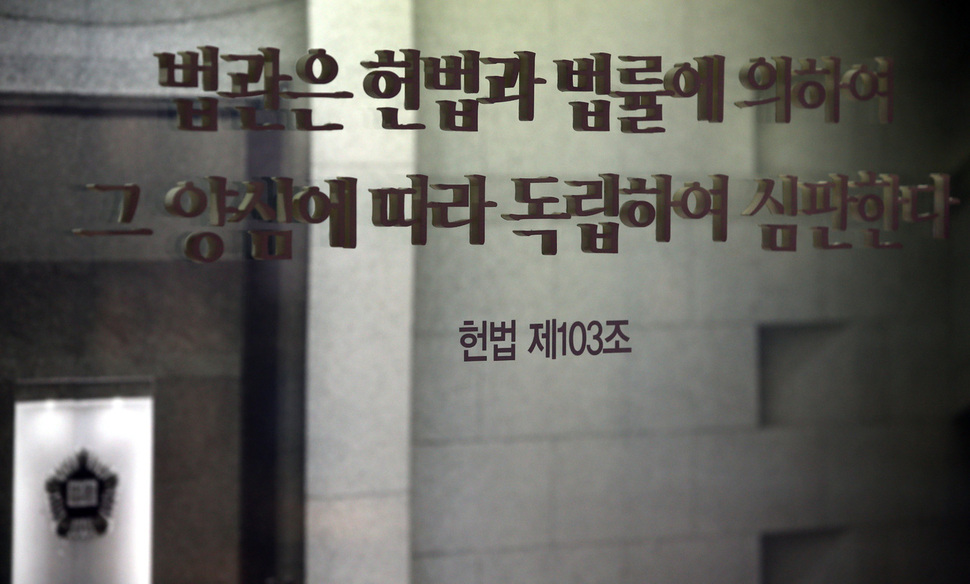 |
|
A phrase regarding the independence and conscientiousness of the courts displayed at the exhibition hall of the Supreme Court of Korea in Seoul’s Seocho District (Kim Tae-hyeong, staff photographer)
|
Kim Myeong-su addresses need to restore public’s trust in courts
On June 15, Kim Myeong-su, Chief Justice of the South Korean Supreme Court, reiterated the need to investigate allegations of “courtroom deals” while expressing his intention to cooperate with an investigation by prosecutors into allegations of judicial misconduct. Kim also hinted that he considers it impossible to restore the public’s trust in the courts without addressing suspicions that the judiciary was striking deals with politicians. While there are signs that senior judges who are liable to be investigated may protest Kim’s statement, the prevailing view is that this will not lead to a radical conflict or showdown. “Courtroom deals should obviously be investigated, too” Kim parted ways with the opposition voiced by a meeting of Supreme Court justices and chief judges and a meeting of presiding judges at the Seoul High Court by stating that “allegations about an attempt to make deals about trials should be addressed as well.” “It is my personal belief that [courtroom deals] would have been unimaginable for any judge in the Republic of Korea,” Kim stated, while acknowledging that some felt that “it was impossible to investigate courtroom deals, since these could not have happened.” During a meeting of chief judges on June 7, 35 chief judges categorically stated that no courtroom deals had taken place: “We are deeply concerned about allegations being raised about courtroom deals, for which no reasonable evidence exists.” Even so, Kim concluded that the collapse of the “appearance of impartiality” was not a situation that could simply be ignored. “Since trials must not only be fair but must appear to be fair as well, it is necessary to address the related allegations, regardless of my personal belief that courtroom deals are unimaginable,” he said. “The judiciary cannot be exempted from an investigation based on the law and principles, and it is obvious that the judicial organization and its members cannot reject or avoid such an investigation,” Kim added. These remarks leave no doubt about the necessity of an investigation. Pushback from high-ranking judges who disagree Shortly after Kim released his statement to the public on June 15, all 13 Supreme Court justices, including Ahn Chul-sang, released a position statement. Ahn, as head of the National Court Administration, led the third special investigatory commission, which concluded that no courtroom deals had taken place. “We can state with certainty that there are no grounds for the allegations about courtroom deals. We must stop creating confusion for the public,” the justices said in their statement. Following a joint position statement in January that there was no inappropriate communication with the Blue House, even the justices that are not implicated in the allegations of courtroom deals have once again openly opposed the chief justice’s position. “If the chief justice’s position is that courtroom deals should be the subject of an investigation, that is a little different from the position adopted in the meeting of chief judges,” said a chief judge serving in the Seoul region. Kim responded by saying, “I think our opinions are consistent in the sense that the Supreme Court justices said that the doubts need to be cleared up.” “Considering that documents [about trials] were delivered to the trial researchers who assist the Supreme Court justices, it is wholly preposterous for the justices to dismiss any and all allegations. The justices should refrain from collective statements of opinion that appear to be designed to cover up suspicions and should humbly await the prosecutors’ investigation,” said MINBYUN-Lawyers for a Democratic Society in a statement released on June 15. A positive reaction from trial judges A large number of trial judges reacted positively to the chief justice’s position statement. “The chief justice clearly expressed his determination to get to the bottom of this,” said a presiding judge at a district court in the Seoul region, while another judge characterized this as “a compromise that does not lean to either side.” The leading viewpoint in the judiciary is that the conflicting opinions and the signs of pushback from high-ranking judges will not lead to an actual “clash.” “Even if the prosecutors ask for a warrant and issue a summons to a high-ranking judge, there won’t be organized resistance by the courts,” predicted a presiding judge at the Seoul High Court. “Since the chief justice’s position remained within the expected bounds, there won’t be major conflict or resistance,” one chief judge said. This is presumably because of concerns that collective resistance could provoke distrust about a judiciary in which judges consider themselves as being “above the law.” By Yeon Hyeon-ho, senior staff writer, and Ko Han-sol and Hyun So-eun, staff reporters Please direct comments or questions to [english@hani.co.kr]






